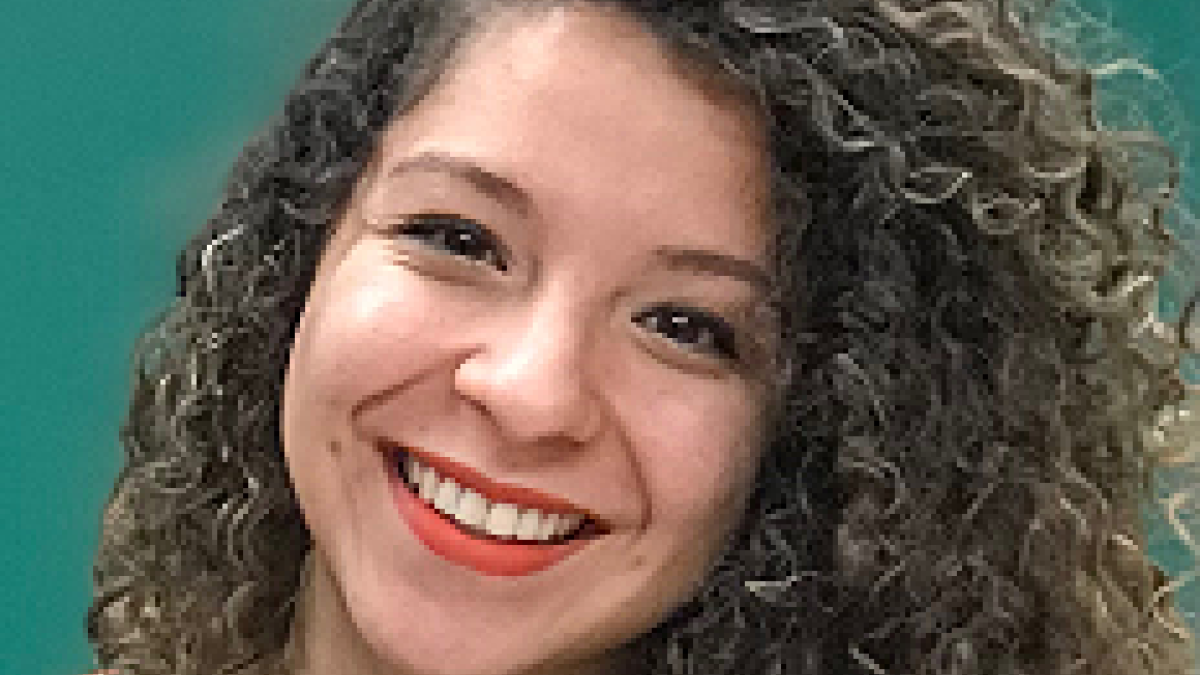Hugh Downs School alumna on how communication is everything

Susana Valenzuela graduated from ASU in 2015.
Susana Rubi Valenzuela's advice to communication majors when asked the infamous question, “What do you do with a communication degree?” — confidently respond: “Everything.”
Valenzuela graduated from the Hugh Downs School of Human Communication in 2015 after majoring in communication and Spanish linguistics with a minor in French. Here, she shares lessons learned and the courses that changed her path.
Question: What's your current job?
Answer: Graduate student and teaching assistant at Saint Louis University.
Q: What was your "aha" moment, when you realized you wanted to study the field you majored in?
A: I knew that I wanted to further study communication when I sat in an intercultural communication course my sophomore year, with now Dr. Tara Franks. She helped me realize that the differences that separate humans, actually connect us through one complex process: the way in which we communicate. Our differences made us unique, and the ways in which we can try to understand each other are endless. Dr. Franks taught this course early in the morning, twice a week; she was always happy and used humor to teach the class about the often-times hard conversations surrounding life in a diverse world. Each and every day I learned something new, something that mattered and something that I could practice.
Q: What made you choose ASU?
A: As a native to both Nogales, Sonora, Mexico, and Nogales, Arizona, ASU always seemed interesting to me. It was not until I visited the Tempe campus when in my senior year that I fell in love with ASU. There was so much attention put on the student that made me feel confident that I would be receiving an exceptional education. The ambience at ASU was intoxicating. Everyone I met reflected a jubilant and competent attitude, which was a blessing from my freshman year all the way to my senior year.
Q: Is there a particular faculty member at ASU who was influential?
A: From the moment that I read Dr. Sarah Tracy’s work in my Advanced Qualitative Research Methods class, I knew that I wanted to take her courses. The first course I took under Dr. Tracy was Communication and the Art of Happiness; by the fall of 2014, I was presented with the opportunity to become a communication apprentice for that course. During this time, Dr. Tracy showed me the multiple ways in which communication is connected to anything and everything, even the way which people communicate about happiness. This connection was reaffirmed when she suggested I take her course Being a Leader, which would be the course that challenged everything I had learned in other communication courses and apply them to real-world conversations and ways of being in this world. I was inspired, challenged and constantly perplexed by the intricacies of the intermingling of both communication theory and concepts like happiness, joy, leadership, mindfulness and understanding. Dr. Tracy saw my increasing interest in communication studies and was a guiding pillar in suggesting I apply to graduate school. She has always been there for me, as a mentor, a friend and, hopefully in a couple of years, as a colleague.
Q: What were the most useful classes you took?
A: I will always refer back to my communication courses. While my Spanish linguistics and French courses taught me new words, forms of expression and different ways to speak, I will always attest that my communication courses taught me how to truly apply language into practice. From Public Speaking to Being a Leader, and everything in between, these classes became an integral part of my everyday communication use. Every single course I registered for in the Hugh Downs School taught me something new — gender and communication, research methods, rhetoric of public memory — all of them taught me skills I still use today. … The faculty concern themselves with teaching theory but also applicability to real-world situations, which made every course extremely advantageous.

Susana Valenzuela
Q: How did this school help prepare you for your current career?
A: The skills that have most been effective for my current career were to establish an inclination to learning, to always strive to be the best I can with the tools that I have in front me, to help others and be there when someone needs help in any form. Above all, this academic institution prepared me to be relentless in my dreams, to think critically in my decision-making, and to use all of my capabilities to help others.
Q: When you were interviewing for your first job out of college, what experiences at this school did you talk about? Internships? Group projects? Study abroad?
A: I was fortunate enough to interview for a position in HR at Chicanos Por La Causa, a Phoenix nonprofit. The most important experiences that qualified me for this job was the amount of involvement I had gained while at ASU. I was a community mentor and a Well Devil under Res Life, and that experience seemed to especially stand out to my employer because they saw that I could deal with adverse situations and handle them with professionalism and poise. I enjoyed conversing about the multiple jobs I held while being an undergraduate, while also incorporating the ways in which I engaged myself in extracurricular and student organizations. Having the communication skills I had gained from working with multiple people definitely helped me ace interviews. Employers want to see that you can give an honest, competent answer to their questions, and not something practiced and mundane.
Q: Were you involved in any student organizations or clubs? Or athletics?
A: I was the president of the undergraduate organization Association of Human Communication under the Hugh Downs School, and was involved in this organization for three years. I was also a part of the Olé Spanish Club, Entre Amigos Spanish Club, and French Club in the School of International Letters and Cultures. Also Sigma Delta Pi — La Sociedad Nacional Honoraría Hispánica, Womyn’s Coalition, Well Devil Coalition, and United Way at ASU.
Q: What advice do you have for students who may be following your path?
A: When asked the infamous question, “What do you do with a communication degree?” — confidently respond, “Everything.” Don’t ever be disheartened. Naturally, you will question yourself, I still do every single day, but you move on. When you feel like the path you are on is filled with walls that are too high, road bumps that are too bumpy, get over it. Persist. I cannot give you my word because life happens, but when you study human communication, you live a happier, more fulfilled life. You start to see the beauty in even the smallest of interactions, like a simple good morning, or an awkward smile while walking by someone. Hold on to those moments. Everything you are doing is because you have had choices, and no matter what choice you make, you have the power to decide what is best; just don’t ever give up.
Q: What's something you learned while at ASU — in the classroom or otherwise — that surprised you, or that changed your perspective?
A: While at ASU, the relentless amount of opportunities for student engagement and success became so incredibly overwhelming, that just being presented with options on how to be engaged in my community, changed the way I am in my present mindful being. I was amazed at just how many opportunities there were for any student, regardless of their background, to succeed, to thrive in what seems to be a mini-city within Tempe.
Q: What was your favorite spot on campus, whether for studying, meeting friends or just thinking about life?
A: It’s a tie between the Secret Garden or the tables outside of the MU. Hands down, the Secret Garden was great for plugging in my earphones, rock out for a bit, then return to the craziness of it all.
Q: If someone gave you $40 million to solve one problem on our planet, what would you tackle?
A: I firmly believe that everyone deserves a place to call home, and the issue of humans escaping a war-torn, corrupt country that is no longer providing basic human rights to its people is an immensely important problem in modern day society. As an immigrant myself, I find that immigration, in general, is a topic of controversy, and there is not enough money in the world to find homes for displaced people. I would work with international organizations to help create a plan to find housing for immigrants escaping their homelands. No human should ever turn away from helping another human seeking shelter and help. It all starts with communicating openly.
More Sun Devil community

Tested tips for taking exams
With May quickly approaching, many students are starting to prep for their most important tests of the year — final exams.Toni…

School of Transborder Studies celebrates 15th anniversary
During the summer before his freshman year at Arizona State University, Salvador Macias participated in the AGUILA Youth…

Barrett program unlocks study abroad for first-year honors students
Twenty first-year students from Barrett, The Honors College at Arizona State University are spending their second semester…

